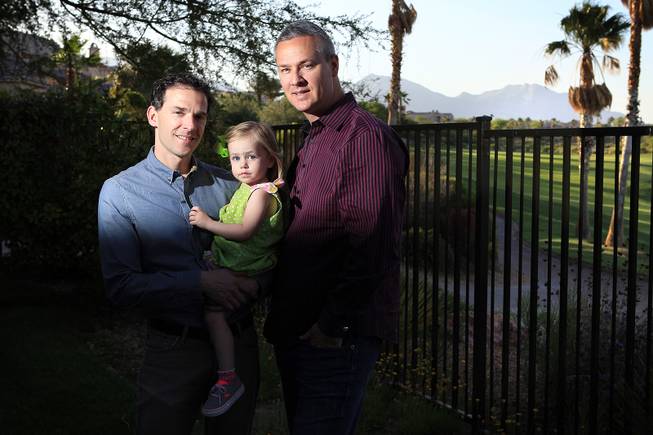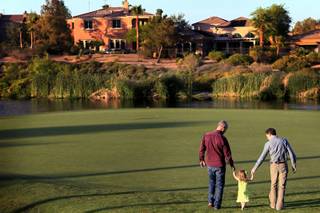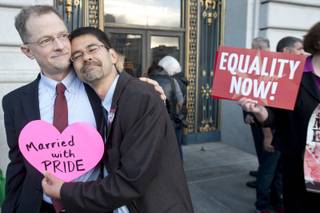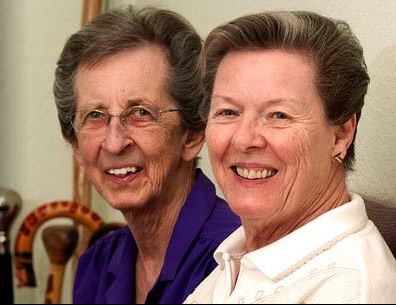
Greg Flamer, left, with his partner Fletcher Whitwell pose with their daughter Hudson Whitwell, 2, outside their home in Las Vegas on May 22, 2013.
Thursday, June 27, 2013 | 2 a.m.
Catching the Supreme Court’s gay marriage ruling meant it would be a very early morning for at least three Nevada couples.
Tara Newberry, 38, and Adele Newberry, 32, together for eight years, woke up their toddler son and infant daughter for the news.
Beverly Sevcik, 75, and Mary Baranovich, 78, together for 41 years, made sure they had set up their TVs to record the coverage on all three major networks.
And Fletcher Whitwell, 38, appointed himself family alarm clock for his partner of 15 years, Greg Flamer, 40, and their 2-year-old daughter Hudson, so that there was no chance they’d sleep through the historic words: DOMA is dead.
“We raised Hudson’s arms in victory,” Flamer said.
Wednesday’s Supreme Court rulings on two marriage equality cases inspired spontaneous celebrations among gay marriage advocates from San Francisco to Washington, D.C.
In two split decisions, the court invalidated a key provision in the federal Defense of Marriage Act, and overturned California’s Proposition 8 gay marriage ban, deciding the case didn’t have standing to be appealed to the nation’s highest court.
But after sharing in those a few moments of euphoria, it was back to life as normal for these Nevada couples: Breakfast to make, kids to get dressed, and a court battle to fight.
“It was bittersweet,” Tara Newberry explained. “On the one hand, there’s federal recognition now, and it means something to those people in states that recognize same-sex marriage. But unfortunately to us here in Nevada, it didn’t really change anything … we’re still in limbo.”
Sevcik and Baranovich, Flamer and Whitwell, and the Newberrys are three of eight couples that have brought a federal lawsuit to overturn the state of Nevada’s ban on gay marriage in federal court.
Their case, filed over a year ago and now on appeal to the 9th Circuit — the same appeals bench that ruled against a gay marriage ban in California’s Proposition 8 case — has been on hold for several months, pending the outcome of the Supreme Court cases decided on Wednesday. The long-awaited decision, however, did nothing to resolve the Nevadans' case.
In striking down the federal definition of marriage as “between a man and a woman,” the court sent a message that it sees federal marriage exclusivity laws as violating “basic due process and equal protection principles,” and having “no legitimate purpose” but “to disparage and to injure those whom the state, by its marriage laws, sought to protect in personhood and dignity.”
But the ruling only applies to the federal law — not to laws in states like Nevada, which prohibits gay marriage in its constitution.
That means the Nevadans’ legal fight lives on.
“Neither of the court’s opinions today decides the case in Nevada,” said Tara Borelli, a lawyer with Lambda Legal representing the Nevada couples in their lawsuit. “These clients continue to have an urgent need for marriage equality in Nevada — and until the state allows couples to marry and recognize the valid marriages … these families will continue to face stigmas and harms.”
Nevada occupies a middle ground among states when it comes to what relationships the state will recognize between gay couples.
Nevada doesn’t allow gay marriages to be performed in the state, and doesn’t recognize gay marriages conducted in another state. But it does recognize domestic partnerships that afford couples some legal rights.
Now, Nevada is sitting at both a geographic and a jurisdictional crossroads with the federal government.
In the DOMA case, the court concluded the federal government could not deny federal benefits to legally married couples, regardless of their sexual orientation. But the court did not rule that all states must recognize marriages performed in every other state.
That leaves gay couples in states like Nevada in some legal gray area, as the disbursement of federal benefits is not uniform: Sometimes, eligibility is determined on universal marital status, but sometimes, it is determined on whether the state one lives in recognizes that marital status.
“The ruling says across the board, all kinds of federal benefits now apply to people who got married in another state but now live in Nevada,” said Ian Bartrum, a professor of constitutional law at UNLV. “And the huge neighbor to the West just legalized same-sex marriage ... within a couple of weeks, we may see more people transplanting to Nevada who have California same-sex marriages.
“So the state may end up having to administer benefits to married couples it doesn’t actually recognize,” Bartrum continued. “It’s a pretty interesting mess.”
Part of the confusion comes from the fact that the rules haven’t been written yet that will govern how homosexual married couples living in Nevada will fare under the federal statues governing tax, Social Security, and hospital visitation rights — rules President Obama has promised to review in speedy fashion.
“It really depends. Nevada’s refusal to recognize existing marriages puts up a painful roadblock for these couples,” Borelli said. “Married couples that live in a state that recognizes their marriages as valid shouldn’t have a problem, but there’s uncertainty about couples who live in nonrecognition states … There are different rules for different programs, and there are a few changes that may even require action by Congress.
“Nevada could sweep away all of this uncertainty by simply ending this discrimination and affording equality,” Borelli added. “Even our married couples continue to live with a cloud of uncertainty.”
It’s an uncertainty that the couple petitioning to change Nevada’s gay marriage ban hope will be cleared up through their own case.
The Newberrys, who met in San Diego, decided to head back to Southern California to get a marriage license when they became available in 2008 — narrowly making the marriage window there before it was closed by the passage of Proposition 8.
But home is in Nevada, where they own a consumer law firm, and where they are only eligible for a domestic partnership, not marriage.
“It’s very frustrating to know that when we go to Disneyland, we’re married, but when we come back to our house, we’re not,” Tara Newberry said.
There are also the day-to-day aggravations of always having to explain a second-tier union status that few seem to understand.
“When we went to register our domestic partnership with a notary, they asked us what kind of business we were going to be opening … because he didn’t understand what a domestic partnership is,” Tara Newberry recalled. “Or when we had to take our daughter to the emergency room, and the nurse asks the harmless question: ‘Which one of you is the real mother?’”
“I’ve even gotten it at Starbucks; people are always trying to figure out any possible way not to see us as lesbian moms,” Tara Newberry continued. “Why do you need to dissect our family? Just give me my coffee … and it’s the same thing with the state government. I just want to not be treated differently.”
Flamer and Whitwell are also waiting to be treated the same as all other families — but they elected not to cross the border to California to speed things along.
“We love living here. We don’t want to go to California just to get equal rights, we want to have them here,” Flamer said. “So we’re digging in our heels.”
Flamer, who licenses foster homes for Clark County, and Whitwell, who is a vice president at communications consulting firm R&R Partners, met in Chicago in 1998, and got a domestic partnership in Nevada in 2007. But they began to feel the void of not having the ability to be married when they decided to adopt a child.
“We want Hudson to grow up with married parents,” Flamer said in a phone interview from the family car Wednesday, scrambling to get their daughter to day care before work.
“We’re out, we’re open, we’re accepted at work and with our families,” Whitell added. “But I think being able to actually wear a ring that symbolizes marriage, and say we truly are her daddies — even though we are — I think that will mean a lot.”
Sevcik and Baranovich, the lead plaintiffs in the lawsuit, have lived in Nevada since 2001. They entered into a domestic partnership “as soon as it was announced,” Baranovich said.
For them, having the ability to fully marry may bring the biggest lifestyle changes of all.
Baranovich and Sevcik met in the 1960s, realizing their shared feelings for each other after years of living across the street as neighbors in Seattle.
To be together, Baranovich left another woman she had been involved with. Sevcik left her husband, and risked losing custody of her three children, then ages 8, 10 and 12.
She didn’t, but only because for years, they never spoke of their relationship — not to their families, not to Sevcik’s ex-husband, and not even to the kids.
“It really hasn’t been until the suit with Nevada was filed a year ago that we actually, if you will, came out of the closet,” Sevcik said. “We aren’t the type of people who run around and flaunt being partners.”
“There’s still a lot of homophobia in the world … we always felt we needed to be closeted,” Baranovich added. “A lot of it has to do with our age, and where we came from … But our laws also discriminate against us. We hope these (Supreme Court) decisions will give us a psychological freedom that we’ve never felt before.”
As senior citizens, Sevcik and Baranovich could cite many practical reasons to desire the status of a married couple. There are Social Security benefits to be had, and they aren’t that far in age from Edie Windsor, 84, the widow whose wife’s estate became the subject of the Supreme Court’s DOMA review.
But Sevcik and Baranovich say after years of documenting the unique status of their union, validation is most important thing they seek from marriage.
“If this is the last thing I ever do before I die, I’ve got to do it,” Baranovich said of her suit. “I’ve got to do anything and everything I can to create liberty and justice for all.”
“We feel that we are the history of the where the Supreme Court was today,” Sevcik said. “And we’re delighted to know that the footsteps we’ve made in our 41 years together are in the past.”
The 9th Circuit is not expected to expedite the appeal against the Nevada marriage ban because of the Supreme Court’s rulings, and the tentative schedule for the case will carry at least into 2014, and possibly beyond. Parties in the suit have been given a filing deadline of Oct. 2 for briefs; no oral arguments have yet been scheduled.
If things move swiftly, the couples could see a resolution to their cases within two years. If not, the pace of a constitutional referendum — set in motion by the Nevada Legislature this past session — could deliver a verdict on the status of gay marriage faster.
Earlier this year, lawmakers passed Senate Joint Resolution 13, which would allow Nevada voters to decide whether to extend equal marriage rights to all couples, regardless of sexual orientation. If the 2015 Legislature passes the resolution a second time in 2015, the question would appear on the 2016 ballot.
“Whether it comes from our case or it comes from the voters, I’m ever-hopeful that people will see that marriage status should be attainable, equally, by two persons committed in a loving relationship,” Newberry said. “My hope is that by the time my children are of an age of cognition to remember their childhood, that they won’t remember anything other than us being married.”
“I think Las Vegas, and Nevada, are ready for this for sure,” Flamer said. “Social change happens slowly, we understand that, but this is a step in the right direction, so we’re definitely willing to wait a little longer.”
And then there’s Sevcik and Baranovich.
Since the day they filed their lawsuit, they have allowed themselves the luxury of starting to fantasize their dream wedding — just in case it actually works.
“I’ve already written my vows,” Sevcik said. “We just don’t know what to wear.”
“We have lots of clothes,” Baranovich reminded her.
After so many years keeping their relationship a secret, both Sevcik and Baranovich say they are stunned to have received so much support.
“Never in our lifetime did we think we’d see the legalization of gay marriage,” Sevcik added. “Look at it this way: 41 years we’ve waited. We can hang in there a little while longer.”
CORRECTION: This version corrects the spelling of Tara Borelli. | (June 27, 2013)




Join the Discussion:
Check this out for a full explanation of our conversion to the LiveFyre commenting system and instructions on how to sign up for an account.
Full comments policy